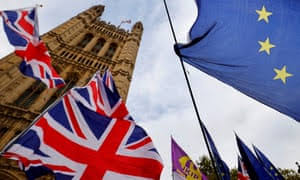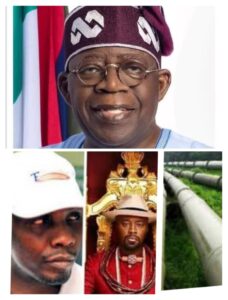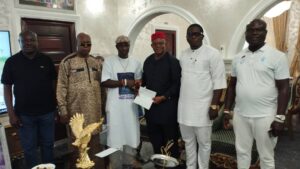WHAT LESSONS FOR NIGERIANS ON BREXIT?
By Zik Gbemre
Without a doubt, every time one considers the level of order, civility, maturity, integrity, principles and respect for citizens’ rights/opinions; often demonstrated and exhibited by the developed nationalities and the political class in United Kingdom (UK), Europe, America and other developed societies across the globe, one is greatly amazed at the efforts these people make in addressing their deep-rooted socio-economic and political problems. This also makes one to wonder when will our country Nigeria, and most countries in Africa be able to attain and practice such height of good governance, respect for the rule of law and respect for citizens’ rights? These were our thoughts, right from when, in June 2016, the people of Britain in a very polarized referendum voted 52% to 48% to leave the European Union (EU).
For those who listen to news, especially international news, you would definitely have heard the term ‘Brexit’. Coined from Britain- Exit, the term refers to Britain’s decision to pull out of the European Union. Interestingly, it will be over 70 years after the establishment of the EU, that the United Kingdom will be the first country to demand an exit. The decision was the direct consequence of the said referendum (poll) where 52% of the population voted ‘Leave’ over the 48% that voted ‘Remain’. Such a referendum is the first of its kind, with no precedent, or example as to how the proceedings will go, or what the world should expect. Analysts in the world over have however attempted to predict events that will follow and likely implications. And recently, Angela Merkel warns EU to see “Brexit as a wake-up call.” The decision the British people made to leave the EU was indeed a momentous and historic one. It will lead to change, and much detail about that change is still uncertain. But there are some very important certainties. For us, looking at the Nigerian situation and its future, what lessons are there?
For Nigeria as a commonwealth nation, the eventual implications of Brexit might trickle down to us. According to some economic analysts, looking at the economic angle, in the immediate aftermath, there are just a handful of markers to consider in discussing Brexit for the benefit of Nigerians. One of which is a possible weaker Great Britain Pound, relative to other currencies. Hence buying pounds now might not be a great idea. On the other hand, Shopping in the UK might be less expensive as the Naira will likely buy more than it would have before now. Another possible implication is Risky Investment threshold: Brexit poses a lot of political and economic uncertainty pending the actualization of the breakaway. Foreign investors would be wary of pumping money into unstable economies. Hence, developing countries like Nigeria, which are generally considered as high-risk investment destinations, are likely to witness even more reduced foreign investments. Another implication is Lower oil prices: In the aftermath of the Brexit vote, oil prices have weakened which is a negative for Nigeria as a major oil exporting country. The situation remained so until the recent rivalry between the US and Iran, which has somewhat affected oil price on a positive note for Nigeria. There is also the issue of difficulty in Eurobond issuance, or it being inflated. In other words, Nigeria will be forced to look within for revenue: As a consequence of the above, including the potential decline in foreign investments, Nigeria will have to innovate internally to raise the funds needed to run the nation.
Aside the economic possibilities however, other analysts have also noted that there are several lessons in Governance, which we ought to take as a country from this Brexit situation. One of which is the issue of Manifestos by the political class. In 2010, the UK Conservative Party (also known as the ‘Tories’ or ‘Tory Party’) did not win enough seats to secure an outright majority in the UK Parliament, and they had to form a Coalition Government with the Liberal Democrats (the “Libdems”). The consensus was that one of the key reasons for the result at the polls and a threat, that was growing stronger as the number of Traditional Tory voters being attracted by the UK Independence Party (“UKIP”), at the time under the leadership of Nigel Farage, had its unequivocal anti-EU policy. To ward off this threat in 2015, the Tory Manifesto promised a referendum on Britain’s membership of the EU. The Tories won an outright majority this time, and as a party that was pro-EU membership, they could have sat on the referendum question. But Manifestos matter a great deal in Britain, and reneging on that key promise would very likely have had an impact on the next general elections.
Looking at the Nigeria situation on the other hand, our politicians treat party Manifestos a little more aspirational, rather than ‘firm Commitments’ the government makes as the deal for getting elected. Of course, there is the argument that manifestos cannot be 100% binding. However, when they are routinely cast aside, or are only a very sketchy guide at best, the inevitable result is the cynicism and “I don’t care” disposition our country’s political class drips with today. If a party, or a public official is unable to fulfill the key planks of their Manifesto, what then is the basis for re-electing them? Or if indeed, they were supposedly re-elected in the first place, especially since free and fair elections have become scarce in Nigeria’s political experience.
From the UK’s example and Brexit experience, “Power rests with the People. This statement implicitly assumes that power rests with the people, that elections are free and fair, and that politicians and public office holders believe they are Accountable To The People that put them there in the first place. But sadly in Nigeria, the compelling evidence is to the contrary, as elections are extremely violent and bloody. And afterwards, Nigerians are not allowed to protest against government policies, or express dissent without the State (Department) Security Services (SSS/DSS) arresting them or inviting them for questioning. And as for Accountability, we have always had Presidents and several State Governors, which include those in the present administration, who will not present themselves regularly to the press and the Nigerian public to answer questions, even though they can, in all likelihood, handpick a friendly press panel.
Our Nigerian politicians and public office holders must learn that, the only reason The Brexit referendum was called and is being sort for, is because the Government of the day in UK (first Theresa May and now Boris Johnson), understood that it served at the pleasure of the people. And since that referendum result was announced, and up till now, the ruling class in the UK have been battling with how it respects the referendum result without breaching the public trust. Virtually every day there is some sort of government briefing or update, with the Opposition and the Press fully holding the government to account. This again shows how ‘Unity’ is always being negotiated. One of the biggest carryovers from Nigeria’s very regrettable experience of military dictatorships is that an inordinate number of Nigerians with authority, civil or government, leads by diktat (which means an order or decree imposed by someone in power without popular consent). Once a leader declares a matter closed, then it is closed, regardless of how open everyone can see that it is. And so, at some point in the past, someone decided that the unity of Nigeria was not negotiable and they even stuck it in Section 2 of the Constitution we were handed by the military.
Agreed that we became a single territorial unit in 1914, so we are a fairly new union compared with United Kingdom where the Union of the Crowns happened in the early 1600s, however, there was a Scottish Independence referendum in 2014 and it has been suggested that there ought to be another one, once Britain leaves the EU, because Scotland voted strongly to remain in the EU at the 2015 referendum. It has also been suggested that there should be an Irish Reunification referendum if Brexit means that there needs to be a more robust administrative division between Northern Ireland and the Republic of Ireland. Even Wales, which would not be able to finance self-government has its own agitators for independence.
Though, Nigeria is far more ethnically heterogeneous than the countries that make up the UK, so there are naturally more competing interests, but it is a known fact that the best forum we have had to discuss these national interests are our various past Constitutional Conferences. But if our Constitutional Conference outcomes continue to remain unimplemented by the present administrations, the fidelity to our supposedly non-negotiable union will continue to be tested without a doubt.
To further complicate issues, is the fact that the country is still being bedeviled by a myriad of social, economic and political challenges of epic proportions. Different reasons have been brought forward as the reason for this; most notable is that of the country’s political leadership in the last two decades. But on the other hand, Britain, Nigeria’s colonial master, has also been going through some sort of ‘renaissance in identity’ and ‘redefinition of their own nationhood’ in recent years, which had led to the referendum and Brexit move. Even in this, they have had to leave (resign) prime cabinet positions due to matters that bother on conscience; trust reposed in them by their respective constituencies, and overall public interest, like we saw with David Cameron, Theresa May, and so many others. This is a point worth driving home when it comes to the dynamics of political leadership as well as governance, going by the manner in which our Nigerian political leaders go about their affairs at different levels of government.
With everything that is currently happening in the country, which have been shaking and threatening its unity, it is becoming more apparent that there is need for a revisit to our past National Conference report for legislative action. The truth of the matter is that the country’s future and progress largely depend on the implementation of some of the recommendations in the most recent past National Conference document, which was done in 2014.
Some couple of years ago, and even up till now, it has become more evident that the majority of Nigerians no longer believe in the structural arrangement of the country and the way things were going. Therefore, there was the need to come together to fashion out a way of living with one another. There is no doubt that a country that has become as fractious as Nigeria needed to put its acts together. It is not for nothing that the country is bedeviled by challenges, some of which touch dangerously on its ‘unity’ and ‘oneness’. It was against this backdrop that the need for Nigerians to convene a conference to provide a platform for a “national conversation,” was birthed. Though, the said national discuss had its flaws and was overpriced and executed with so much waste of public funds, however, at the end of the day a lot was achieved because the national conference was a convergence of various delegates representing the interest of its people to highlight and address a whole lot of issues that have been stunting the growth and development of the nation.
At the cost of about N10 billion, four and a half months of hard thinking, hard bargaining, lengthy, complex, often-times heated discussions, arguments and immense paperwork by 494 men and women, mostly of no mean stature, the Conference produced over 10,000 pages of 22 reports and annexure. They made over 600 recommendations for the improvement of the political, economic and social structures and the overall regeneration of the country. The fact is that no one can wish away this conference as if it never happened. Whereas the report is not perfect, just as the authors are not, it is as good as any document can be to work with in the quest for a new Nigeria. It is a constitutional declaration that the primary purpose of government is the security and welfare of the people. Therefore, any and every government, irrespective of party coloration, is constitutionally bound to implement ideas and sustain measures that benefit the country and its citizens. For the sake of Nigeria and its people, besides the tones of public money expended, the APC-led government must do right by Nigerians and review and implement that report.
Zik Gbemre.
We Mobilize Others to Fight for Individual Causes As If Those Were Our Causes




